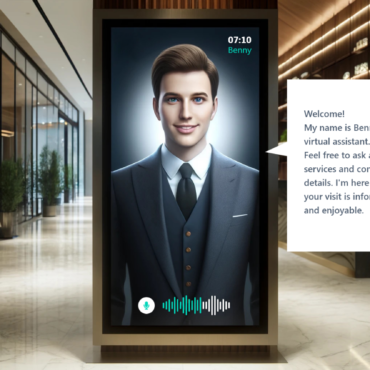Artificial Intelligence in the use
4 case examples
What is artificial intelligence? Where is artificial intelligence used today?
Artificial intelligence (AI) is a subfield of computer science that deals with methods that enable a computer to perform tasks that require human-like thinking skills. With new technologies, AI can be trained for tasks by analyzing and processing large amounts of data, recognizing schemata in it and of course – depending on the task – applying them.
Artificial intelligence is already being used in various areas. Voice recognition or autonomous procedures are common practice. Machine Learning enables industry to analyse large quantities of data and make predictions in order to avoid production errors and increase profits, for example. Companies are already increasing their economic performance through AI procedures and digital processes. In medicine, better diagnoses can be made through image recognition, and in everyday life we encounter artificial intelligence through “Alexa” and “Siri” or automatic parking. Artificial intelligence is already a hot topic.
Artificial intelligence, packaged in modern software solutions and services, supports a wide range of different industries. Examples of business sectors in which artificial intelligence is already being used:
- Media industry (AI writes its own articles, creates summaries of currently relevant topics from the Internet and news agencies and analyses known topics and evaluates them according to their content)
- Wholesale (repeat orders are automatically placed by the AI itself and the article stock is checked)
- Mechanical engineering (automated quality control of components, increase in employee safety and maintenance optimization through AI)
- Water and energy supply (continuous optimisation of water and energy supply)
- Production (error and damage detection and product monitoring by AI, the condition of objects of any kind is recorded and analyzed)
- IT sector (increase in security and efficiency, failures and malfunctions are predicted by the AI)
In all these industries, artificial intelligence can improve existing processes, for example to increase turnover, save time or optimise service performance. But the spectrum is constantly expanding. AI software solutions can be adapted individually and as needed, both for the consumer and for small or large companies. In the following, some selected application examples from very different areas are listed and explained.

Examples of use
AI in supermarkets and discounters
Who does not know the problem? You go to the next supermarket with a shopping list and articles are missing. They are neither on the shelf nor in the warehouse. The employee explains that unfortunately the goods have not been delivered, so the colleague must have made a mistake with the last orders. The consequence is mutual dissatisfaction.
AI can help out here: Artificial intelligence can tell you which product needs restocking with sensors. At the same time, it takes into account the storage locations, checks for quality and contamination, localizes problems and offers solutions – and it does so automatically. For example, incorrect and superfluous orders are corrected with Quality Control, thus avoiding space shortages. Artificial intelligence always counts the goods in real time, checks them, carries out a clear inventory control and searches for specific damage. The skilled worker is supported by artificial intelligence and can thus work more efficiently and in a targeted manner. The AI software is coupled with the existing systems, so that the familiar remains familiar. This increases the acceptance.
Improvement of personnel planning in companies
A lot of things are still done by hand today, even though we are in a digital age. Personnel planning is sometimes even still done on a piece of paper, although simplified programs for this already exist. At the same time, there are many things that need to be included and considered: holidays, appointments, sickness, overtime and minus hours. In case of illness, replacements have to be requested, the wishes of the employees are often not taken into account, a complete overview is missing and makes planning difficult. With artificial intelligence these problems can be tackled. AI considers the problems and difficulties. The recording of central working hours and hour accounts can be automated, because AI analyzes and plans independently and thus reduces the effort of duty scheduling and supports the personnel manager.
Artificial intelligence automatically notifies as soon as an absence has been confirmed and then offers an optimal solution based on the given information.
Personnel planning in hospitals: In view of the increasing shortage of physicians, structured and strategic personnel planning is becoming increasingly important. An advantage here is the significant relief of doctors and employees through artificial intelligence/AI.
Support from AI in warehouse logistics
The tasks of a warehouse logistics specialist are manifold. One of the most important tasks is receiving and checking goods. The quality and quantity of the accepted goods must be checked, and it is also important to know whether the goods were damaged during transport or have other defects. If after a time-consuming inspection something is actually broken, a complaint must be made about the goods. In addition, the goods must be transported and stored. Depending on the type of goods (e.g. for food, or dangerous substances such as gas or oil, special safety regulations apply), the goods must be stored appropriately and optimally. It must be checked whether there is enough storage space available that meets the corresponding requirements. Furthermore, costs must be kept as low as possible while at the same time complying with the standard regulations (storage and transport).
In addition, the skilled worker must proceed in a planned, structured and efficient manner if he wants to assemble goods from different storage locations and make them ready for dispatch.
In all these tasks, the AI is able to support the warehouse logistics specialist enormously. Already at the receipt of the goods it checks for defects or damage. With regard to the storage location, it can see where there is sufficient space and whether the storage regulations correspond to the goods. Thus costs can be reduced and the skilled workers can work more efficiently.
Anonymisation of personal data in the medical field
With the new Basic Data Protection Regulation (GDPR), the secure and rule-compliant processing of personal data has become the norm. In medicine, for example, patient data (images, videos, texts and in the form of spoken language) may not simply be passed on to third parties. A great deal of time and work must be invested before the data can be processed and forwarded accordingly – e.g. by a doctor for an external expertise.
Artificial intelligence is able to make information and data anonymous, even without external intervention (see Blue DSVGO). Large amounts of data are automatically and professionally anonymised and prepared for further use. State-of-the-art AI technology makes data properly unrecognisable, for example by pixelating, making it unrecognisable or adding something else at random.
In addition to images, contracts, protocols, documents, telephone calls, videos and many other formats can also be processed. Not only medical institutions benefit from such AI applications, but also call centers, authorities companies and many other institutions that work with customer-relevant data.
You have an idea how AI can support you in your company or you have a question about our products – contact us.





